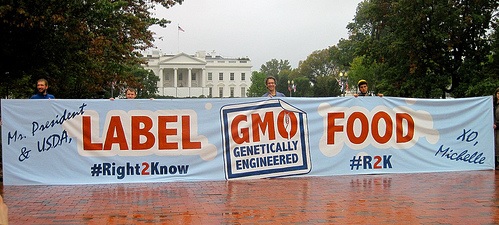 Recent cases on corporate personhood argue that the free speech protections of the First Amendment render many commercial disclosure requirements unconstitutional. Ellen Goodman traces the progression of these cases, arguing that the “more speech is better” ethos of First Amendment law, combined with consumer “rights to know” and the minimal interests of commercial speakers in avoiding disclosure, all work against a permissive review of reasonable commercial disclosure requirements. She writes that these cases reflect a growing trend of economic liberties displacing political liberties in the United States.
Recent cases on corporate personhood argue that the free speech protections of the First Amendment render many commercial disclosure requirements unconstitutional. Ellen Goodman traces the progression of these cases, arguing that the “more speech is better” ethos of First Amendment law, combined with consumer “rights to know” and the minimal interests of commercial speakers in avoiding disclosure, all work against a permissive review of reasonable commercial disclosure requirements. She writes that these cases reflect a growing trend of economic liberties displacing political liberties in the United States.
Freedom of speech is probably Americans’ most celebrated individual liberty. One thinks of the great First Amendment cases that have advanced press freedoms and the rights of individuals to voice unpopular opinions. In the last month, however, we’ve seen a very different deployment of the First Amendment – a cynical use of individual freedoms to shield corporations from commercial disclosure requirements.
Governments have long required manufacturers to disclose to consumers such things as food ingredients, health hazards, business risk, and environmental impact. Indeed, the appeal of disclosure as the light-handed alternative to regulation is rising. The Supreme Court itself recently endorsed campaign finance disclosure in lieu of regulation (McCutcheon v. FEC). Yet recent cases suggest that many of these disclosure requirements will be vulnerable to constitutional challenges from the disclosing corporations. If they win, that could mean no disclosure of genetically-modified organisms in food, no disclosure of broadband download speeds, and even no disclosure of campaign contributions.

Here’s what’s happened. Last year, the D.C. Circuit decided a case about graphic cigarette warnings (Reynolds Tobacco v. Food and Drug Administration). A divided panel held that the new warnings, required by a federal statute in accordance with a World Health Organization treaty, violated the rights of tobacco companies against “compelled speech.” The court refused to apply a Supreme Court precedent giving the government broad authority under the First Amendment to require purely factual and uncontroversial commercial disclosures (Zauderer v. Office of Disciplinary Council). In a recent law review article, I criticized the Reynolds decision, especially for its holding that the Zauderer standard should apply only when the government was trying to combat consumer deception, and not also to other informational goals. The “more speech is better” ethos of First Amendment law, combined with consumer “rights to know” and the rather minimal interests of commercial speakers in avoiding disclosure, all militate towards permissive review of reasonable commercial disclosure requirements.
Last month, the D.C. Circuit seemed to agree. It upheld a Department of Agriculture requirement that meat products bear a label indicating country of origin (American Meat Institute v. DOA). The producers had argued that having to disclose where an animal was raised, slaughtered, and processed violated their free speech rights if the purpose was just to provide consumers with information, rather than vanquishing deception. The court distinguished Reynolds, finding that that case turned as much on the strength of the tobacco manufacturers’ speech interests in avoiding disclosure as on the consumer-deception rationale of Zauderer. Given the reduced magnitude of the meat producers’ speech interests, the court held that Zauderer’s permissive standard applied.
The winds blew in another direction this month. On April 4, the D.C. Circuit decided on its own to review its American Meat Institute panel decision en banc. Arguments are set for May 19. And last week, a divided panel of the D.C. Circuit struck down a disclosure requirement on First Amendment grounds. As part of the 2010 Dodd-Frank securities reform, Congress required issuers to disclose information about their use and sourcing of “conflict minerals” originating in the Democratic Republic of the Congo and associated with extreme violence, especially against women. Because it’s hard to trace these materials, the rule mandated an infelicitous double-negative disclosure, obligating issuers to say whether their products had “not been found to be ‘DRC conflict free.’” According to the court’s decision in National Association of Manufacturers v. SEC, this requirement is unconstitutional. The court reverted back to Reynolds’ narrow reading of Zauderer and the limitation that it should apply only in cases of consumer confusion.

It seems likely that the full D.C. Circuit will ultimately endorse the Reynolds/National Association of Manufacturers reading of the First Amendment and Zauderer’s applicability. The First and Second Circuits have taken different approaches, setting the stage for Supreme Court review. If the cramped reading of Zauderer holds up, many reasonable commercial disclosure requirements will be imperiled. Manufacturers do not deceive consumers by concealing relevant information. But there still may be a strong governmental interest in providing consumers with that information and relatively weak private interests in concealing it. Requirements to disclose things such as the presence of GMO ingredients and the environmental impact of products would be subject to heightened review under the Reynolds approach. Linda Greenhouse, in her New York Times commentary on the Supreme Court’s campaign finance decisions, astutely noted that the Court was leaning on disclosure requirements as the solution to the “money in politics” problem — requirements that might well be doomed under a perverse reading of First Amendment protections.
What seems to be happening in First Amendment law reflects what is happening in America more generally—economics liberties are becoming more narrowly concentrated and displacing political liberties. You can call this the “Lochnerization” of the First Amendment or simply the constitutional vindication of sovereign corporate power.
This article originally appeared at the Rutgers Institute for Information Policy & Law blog.
Please read our comments policy before commenting.
Note: This article gives the views of the author, and not the position of USApp– American Politics and Policy, nor of the London School of Economics.
Shortened URL for this post: http://bit.ly/1iHh1JQ
_________________________________________
 Ellen Goodman- Rutgers University
Ellen Goodman- Rutgers University
Ellen Goodman is a Professor at Rutgers University School of Law. Her research interests include media policy, spectrum policy, the use of information as a policy tool, advertising law, and the informational aspects of sustainability policy. She is an animal law expert and pioneered the teaching of animal law at the law school. She is Co-Director and co-founder of the Rutgers Institute for Information Policy & Law (RIIPL). Professor Goodman recently served as Distinguished Visiting Scholar at the FCC and helped in the production of a pathbreaking report on the Information Needs of Communities. She tweets @ellgood.






